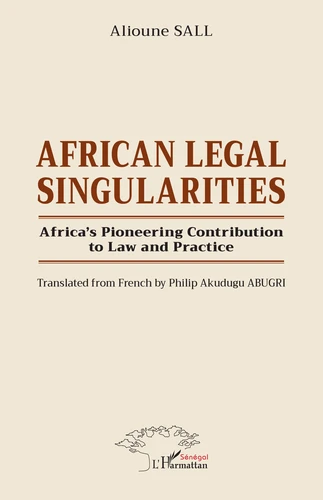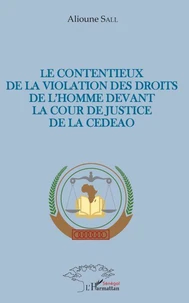African Legal Singularities. Africa’s Pioneering Contribution to Law and Practice
Par :Formats :
- Paiement en ligne :
- Livraison à domicile ou en point Mondial Relay indisponible
- Retrait Click and Collect en magasin gratuit
- Réservation en ligne avec paiement en magasin :
- Indisponible pour réserver et payer en magasin
- Nombre de pages304
- PrésentationBroché
- FormatGrand Format
- Poids0.46 kg
- Dimensions15,5 cm × 24,0 cm × 1,6 cm
- ISBN978-2-336-50388-2
- EAN9782336503882
- Date de parution19/12/2024
- ÉditeurL'Harmattan
- TraducteurPhilip Akudugu Abugri
Résumé
The legal inventiveness of contemporary African societies has not received the attention it deserves. A widespread prejudice too often consists in presenting the rules of law as a kind of artifice condemned to oscillate between mimicry and ineffectiveness, between extroversion and disembodiment. To counter this popular misconception, the author gives ten examples, evoking ten themes touching on major legal issues, in which Africa has created, refined, enriched, or sublimated principles or institutions.
Ten examples through which, while remaining firmly within the realms of modernity, the African continent can certainly claim a kind of precedence and, perhaps, exemplarity. Firmly rejecting any vertical or monopolistic rationale, the book is based on the conviction that the development of law takes place in a horizontal mode of osmosis, hybridisation, and polycentrism. It is an exhortation to look at what is being done elsewhere, an invitation to listen and to explore new horizons.
Ten examples through which, while remaining firmly within the realms of modernity, the African continent can certainly claim a kind of precedence and, perhaps, exemplarity. Firmly rejecting any vertical or monopolistic rationale, the book is based on the conviction that the development of law takes place in a horizontal mode of osmosis, hybridisation, and polycentrism. It is an exhortation to look at what is being done elsewhere, an invitation to listen and to explore new horizons.
The legal inventiveness of contemporary African societies has not received the attention it deserves. A widespread prejudice too often consists in presenting the rules of law as a kind of artifice condemned to oscillate between mimicry and ineffectiveness, between extroversion and disembodiment. To counter this popular misconception, the author gives ten examples, evoking ten themes touching on major legal issues, in which Africa has created, refined, enriched, or sublimated principles or institutions.
Ten examples through which, while remaining firmly within the realms of modernity, the African continent can certainly claim a kind of precedence and, perhaps, exemplarity. Firmly rejecting any vertical or monopolistic rationale, the book is based on the conviction that the development of law takes place in a horizontal mode of osmosis, hybridisation, and polycentrism. It is an exhortation to look at what is being done elsewhere, an invitation to listen and to explore new horizons.
Ten examples through which, while remaining firmly within the realms of modernity, the African continent can certainly claim a kind of precedence and, perhaps, exemplarity. Firmly rejecting any vertical or monopolistic rationale, the book is based on the conviction that the development of law takes place in a horizontal mode of osmosis, hybridisation, and polycentrism. It is an exhortation to look at what is being done elsewhere, an invitation to listen and to explore new horizons.






















